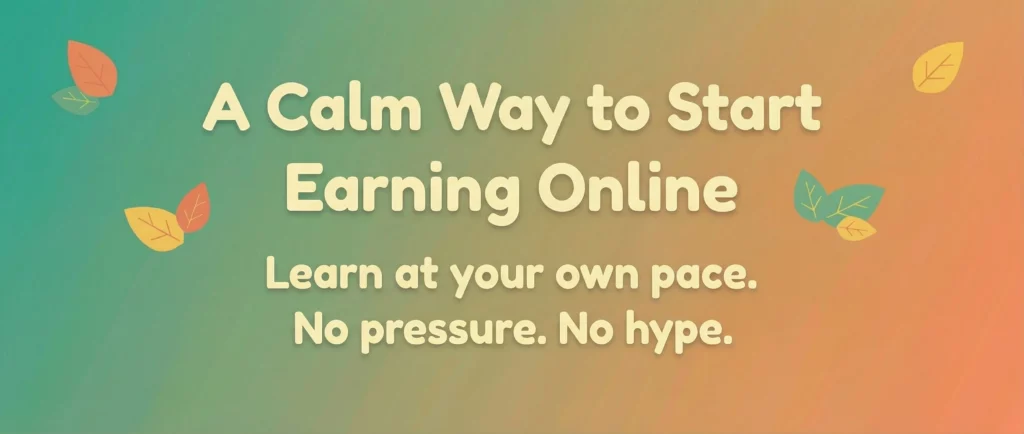Affiliate marketing keeps popping up in every corner of the online business world, and for good reason. It’s actually a straightforward way to make money online by recommending products or services to others.
When someone makes a purchase using your referral, you pocket a commission. That’s the idea anyway, but if you’re new, it helps to dig into the layers and get a feel for what’s really going on. This guide will break down what affiliate marketing is, how you can get started, and all the important stuff to think about before you jump in.

Understanding Affiliate Marketing A Beginners Guide
Affiliate marketing works by connecting companies that sell products to people who want to make extra money recommending them. Think of yourself as the middleman. You don’t make the products and you’re not in charge of customer support, but you do talk about what’s out there; and if people buy through your referral link, you get a cut of the sale.
This method has really grown as more shoppers trust real-life recommendations about products instead of traditional ads. Big retailers like Amazon, Target, and Walmart even have their own affiliate programs now. Estimates say that affiliate marketing is now responsible for about 15% of all digital media revenue (Statista).
One of the main draws to affiliate marketing is how hassle-free it is to start. You don’t need to rent an office, buy or ship inventory, or do any customer service. All you really need is a space online—a website, blog, or social media account—where you can post your recommendations and interact with people.

How Affiliate Marketing Works (Step-by-Step)
Getting a sense of the step-by-step process makes things easier before you get involved. Here’s how it usually works:
- Find an Affiliate Program: Check out companies you already like or use. Look for affiliate programs listed on their websites. You will find this in most cases in the footer at the very bottom of the page. Or visit an affiliate network that brings lots of options together, like Awinor CJ Affiliate.
- Get Your Unique Link: Once approved, you’ll receive a special affiliate link that tracks clicks and sales from your efforts.
- Share the Link: Post your affiliate link in blog posts, YouTube descriptions, social posts, or even email newsletters.
- Visitor Buys, You Get Paid: When someone purchases using your link, you snag a commission—either a percentage of the sale or a set amount.
Some programs pay for sales only, while others pay for leads—like an app install or account sign-up. There’s always a payment structure, and you’ll be able to keep a track of your results in an affiliate dashboard.
Quick Guide: Starting Out in Affiliate Marketing
Having a plan sets you up for success from the start. Here’s a solid approach to getting going with affiliate marketing:
- Pick a Niche: Focusing on a particular topic or industry—like fitness, travel, tech, or cooking—helps shape your brand and builds credibility. Sticking to what you care about also makes sharing feel authentic.
- Build a Home Base: A website or YouTube channel is most common, but social media can also be your launchpad. That said, having your own site gives you the most freedom and control.
- Sign Up for Affiliate Programs: Apply to programs that fit your niche, and always double-check their terms so you know what’s allowed.
- Create Useful Content: Focus on product reviews, guides, comparisons, or helpful tutorials. Give honest info and help your readers figure out what to buy.
- Promote and Get Traffic: Share your posts on social, get into SEO basics, and work on slowly building your audience, trust and reach.
Following these steps puts you on the right path to earning your first commissions and keeps your efforts organized.
What to Consider Before Getting Started
Affiliate marketing sounds simple, but there are a few things folks overlook early on. Here’s what to think about before you put in the work:
- Payout Timing: Many programs have a minimum payout or pay monthly. Get familiar with their policies so you don’t have surprises.
- Cookie Duration: The “cookie” tracks referrals. Some last 30 days, others just 24 hours. Longer cookies give you a better shot at earning commissions.
- Competition: Crowded markets make it harder to stand out. Find a unique angle or focus on a tighter subject to set yourself apart.
- Disclosure: Be upfront that you might receive a commission. This isn’t just the law—it builds trust.
- Quality Over Quantity: Only recommend products or services you genuinely like and believe in. People can pick up on insincere advice.
Payout Timing
Usually, there’s a short wait before you receive your money. Advertisers need to process refunds, so your first commission might not arrive for a month or two. No need to panic—this is totally standard, and consistent effort pays off in the end.
Cookie Duration
The lifespan of the tracking cookie is important. A 30-day cookie means if someone buys within a month, you still earn commission. Shorter durations may mean you miss out on sales if readers take longer to decide.
Competition
It’s easy to feel discouraged if big players dominate your chosen niche, especially in popular markets. Instead, get creative. Shrink your niche or add your own personality to your content to carve out a loyal audience.
Quality Over Quantity
If your recommendations seem forced or disconnected from your true opinions, people will notice quickly—possibly even before you do. Sharing your firsthand experience and honest opinion isn’t just better for your reputation; it’s what keeps people coming back.
These issues are perfectly normal for beginners. But the more you learn, the easier it is to sidestep common mistakes. No one starts an expert, and affiliate marketing rewards patience and smart effort over time.
Pro Tips: Taking Affiliate Marketing Further
With the basics under your belt, there are a few ways to give your affiliate marketing game a boost and make your earnings more stable in the long run. Here’s what seasoned affiliate marketers swear by:
Focus On Evergreen Content: Content that stays useful for months or years continues to earn for you in the background. In-depth “best of” lists, reviews, and tutorials are always a smart investment.
Experiment With Different Programs: Don’t be afraid to try new affiliate networks or swaps if you aren’t happy. Some programs pay more or have perks worth checking out—testing helps you find the right mix.
Collect an Email List: Start an email list early. This way, you always have a direct line to your subscribers, even if algorithms or traffic sources change. Newsletters with helpful info and product links can build loyalty and repeat commissions.
Tweak and Improve: Pay attention to what works and what doesn’t. Check your analytics, test different placements for links, and always look for ways to add value and connect with your audience.
Affiliate Marketing in Action: Real Examples
Affiliate marketing matches all kinds of interests, from tech geeks to foodies to travel enthusiasts. Regular folks are bringing in extra income using simple methods like these:
- Product Reviews: Thorough, honest reviews help readers decide what to buy and encourage them to use your recommendations.
- “Best Of” Lists: Curated lists like “Best Running Shoes” or “Top Kitchen Gadgets for Beginners” point readers towards solid options and provide more chances to click your links.
- Tutorials and How-To Guides: Step-by-step guides not only help readers solve problems, but they also naturally include product mentions—all leading to your affiliate links.
Take travel bloggers, for example. Many partner with hotel booking services or suitcase brands. When readers book a trip or buy a bag through the blogger’s link, the blogger gets a commission. The catch? The advice has to be genuinely helpful for it to work.
Frequently Asked Questions
These are some common questions that come up when people get curious about affiliate marketing:
How much money can you realistically make with affiliate marketing?
There’s a big range. Some beginners earn a little each month, while others turn it into a real income. It all comes down to how much effort you put in, the niche you pick, and staying consistent.
Do I need a website to start affiliate marketing?
Not always. A website helps, but plenty of people use YouTube, social channels, or email newsletters—just make sure to follow each program’s rules.
Are there any upfront costs?
Most affiliate programs are free to join. Any costs are for website hosting, domain names, or maybe ad spend and learning resources. There’s no need to buy inventory or pay hidden fees to get started.
Final Thoughts
Affiliate marketing is a surprisingly accessible way to start earning online, even if you only have a small following at first. Its biggest strength is flexibility—you choose your hours, recommend products you really trust, and slowly build up smarter systems as your skills grow. Whether your goal is just to cover a bill or to build a bigger business, affiliate marketing is worth having a crack.
The great part is, the skills you pick up will also help in blogging, digital marketing, or building your own e-commerce venture.
Give it a go, be patient, and never stop learning on your adventure into affiliate marketing!

